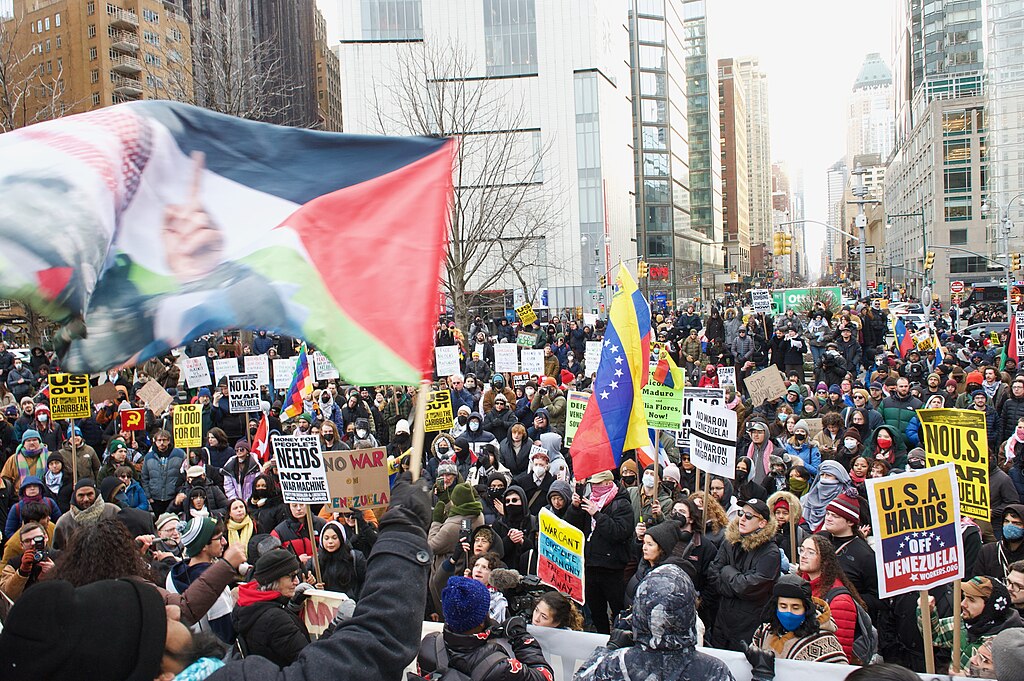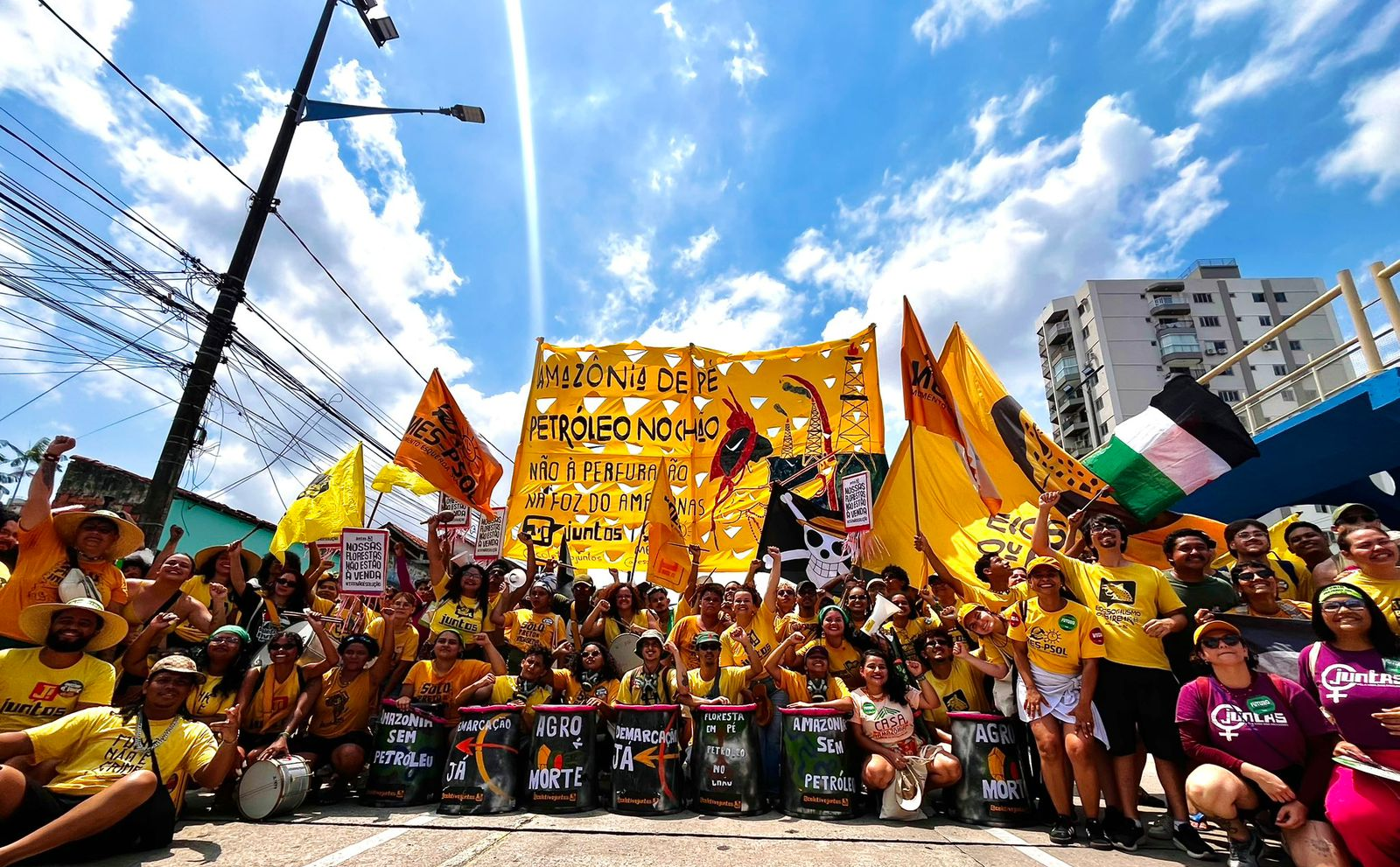The Democratic Socialists of America (DSA) has been under fire after publishing two statements on the Russian invasion of Ukraine. The first statement, from DSA’s International Committee (IC), released three weeks before the invasion began, focuses on NATO’s aggression in Eastern Europe and calls the 2014 Maidan Revolution in Ukraine a “US-backed coup,” while failing to criticize or even mention Russia’s troop build-up on Ukraine’s border or Vladimir Putin’s threats to invade.
Once the war began, DSA’s second statement, from the National Political Committee (NPC), opened with a condemnation of Vladimir Putin’s “illegal” invasion, and ended with a “call for the U.S. to withdraw from NATO and to end the imperialist expansionism that set the stage for this conflict.”
Liberal and conservative media outlets and politicians have now weaponized the statements against DSA, creating one of the most significant national controversies for DSA in recent history.
And the response has been overwhelmingly negative. Democratic congressperson from New York Richie Torres claimed that DSA had joined Fox News’s Tucker Carlson in a “pro-Putin axis,” despite DSA’s clear opposition to Putin’s war. Fox News did their own segment on it, and the conservative New York Post published an article titled, “Strange left-right alliance making excuses for Putin,” which compares DSA to Steve Bannon.
The New York Times published a New York-focused piece last week featuring denunciations of DSA from liberal New York politicians.
Given that the New York Times has promoted support for equally disastrous and illegal wars in Iraq and Palestine — and that’s just in the 21st century — the reporters’ glee in boosting attacks on DSA’s anti-war position should not be surprising.
But while it is satisfying for U.S. leftists to point out liberals’ hypocrisy, it’s disappointing to see that none of the prominent DSA leaders contacted by the Times for comment gave a compelling defense of DSA’s position. There was no comment from DSA’s NYC-based national director, Maria Svart; no comment from DSA-backed New York congresspeople, Jamaal Bowman (elsewhere Bowman affirmed that he supported NATO) and Alexandria Ocasio-Cortez; and no comment from any of the twelve DSA-backed politicians and candidates in state and city politics from New York City.
One DSA National Political Committee member, Ashik Siddique, is quoted saying that DSA’s criticism of NATO as a force that promotes war and destabilization is part of a “longstanding tradition with the US Left as well as in Europe.” While this is true, it is not a full-throated defense or even explanation of DSA’s anti-NATO demand. (It’s of course possible that the Times left out a longer defense by Siddique.)
The Los Angeles Times published an LA-focused story on DSA’s Ukraine statements, in which both DSA-backed politicians and their liberal opponents gave comments. Both groups disagreed with DSA’s anti-NATO stance.
Unlike a DSA International Committee member who told The Nation that all of this negative attention “goes to show that we’re definitely doing something right,” I think DSAers should be troubled by this incident.
The outsized media attention has been a missed opportunity to put forward a stronger socialist anti-war position to an audience much larger than DSA usually reaches. And the episode gave a world-wide megaphone to DSA’s detractors who could claim that the leftist opposition to U.S. warmongering is equivalent to support for Putin — with no compelling response from the Left that any of the millions of cable news viewers and LA and NY Times readers will see. In fact, DSA’s wrongheaded IC statement from January and the insufficient subsequent NPC statement are sadly some of the most publicly-discussed national political interventions DSA has made since socialism’s revival in 2016.
Democratic socialists believe that only mass movements of ordinary people can overcome the entrenched power of economic and military elites, end war, and ultimately transform society. But today, millions of working people are either indifferent to the issues we care about or actively support reactionary pro-war and pro-capitalist ideas. Many people understandably think our most radical demands are utopian and hopeless. If DSA wants to change the world, we have to build the fight against reactionary ideas in ways that can affect the consciousness and break the apathy of those millions.
That is why DSA and its leaders must embrace their roles as tribunes for socialist politics. In order to do this effectively, we must have a strong and compelling message to fight for; this includes overcoming the confused and outdated politics of “campism” which has weakened the Left’s response to the current war. And DSA should invest in building our mass media capacities, to oppose warmongering and get our message out to millions of people looking for an alternative to the hellish status quo.
What Should DSA Have Done Instead?
DSA’s first statement, from the IC, has been rightfully criticized as tacit apologism for Russian imperialism. (More on this below.) Many in DSA were relieved that the NPC statement made up for this by clearly opposing Russia’s invasion. But the second statement was still weak. By calling for the US to withdraw from NATO — a maximalist demand that obviously won’t happen anytime soon — the NPC statement has little to say about practical steps activists in the U.S. could take now to end the war. (Not even Putin is demanding U.S. withdrawal from NATO; but near-term demands, such as guarantees of Ukrainian neutrality, are achievable now and could help end the war.)
Further, the anti-NATO demand came with no positive alternative. This is like saying we want to abolish private health insurance while failing to mention that we want to replace it with a free, democratic, and universal alternative: Medicare for All. And the statement lists only one explanation for the war: NATO’s “imperialist expansionism.” While this is part of the story, the statement is incomplete because it never condemns (or even names) Putin’s own imperialist ambitions. This left DSA open to the same attacks as the first statement, that we are Putin apologists and, to quote progressive California politician Kevin de León, that DSA is not “well equipped to deal with a real-life matter — thousands of people who are being massacred right now.”
However, a weak statement isn’t a big deal on its own. What turned this statement into a fiasco is the fact that this statement and the much worse IC statement are virtually the only source of DSA’s ideas about the war that most people have been exposed to. This leaves too much room for people to (mostly unfairly) twist DSA’s ideas into caricatures, like saying we support Putin. Meanwhile, no one from DSA has effectively pushed back on these or clarified what our position really means.
Instead of hiding from the media, any of those asked for comment in the New York Times piece could have easily responded with a strong defense of socialist principles. Such a defense might look like the following:
We oppose Russia’s illegal and brutal war in Ukraine, just as we opposed the U.S. invasion of Iraq before, and the U.S.-backed occupation in Palestine and invasion of Yemen today.
Yes, we oppose U.S. militarism and ultimately support replacing NATO with an alternative mutual security arrangement and a reformed United Nations that will support peace and democracy. However, right now we are committed most of all to ending this war, and while NATO isn’t going anywhere tomorrow, part of peace negotiations today should be agreements for Ukrainian neutrality and the end to eastward NATO expansion.
But by pointing to the role that the U.S. government and NATO have played in creating this crisis, socialists aren’t supporting Putin or excusing his actions. Putin has turned Russia into a police state, arresting and murdering his political opposition as his army bombs the homes of Ukrainian families. We oppose U.S. sanctions that are a form of inhumane economic warfare against working people in Russia, but we unequivocally oppose Putin’s regime.
The American working class, along with the Russian and Ukrainian working classes, deserves security, universal healthcare, tuition-free college, good public schools, repairs to our crumbling roads, and clean energy. Right now, billions of our tax dollars, which could be used to promote prosperity and peace, are instead pouring into wars that make us less safe, not more.
We support the Ukrainian and Russian people in their heroic opposition to this war, and DSA promises to oppose U.S. military intervention in Europe or anywhere else.
DSA’s national director, our socialist politicians, and other DSA leaders should be trying to get on CNN, in the New York Times, and in any local or national media outlets we can to spread this message, to fight against the hawks pushing us towards nuclear apocalypse through their euphemistic “no-fly zone,” and to correct anyone who accuses DSA of supporting Putin and his war.
Of course, DSA can’t only rely on corporate news outlets to keep giving airtime to Leftists. DSA should expand our own media operations in order to reach a mass audience with our politics, including hiring staff to run our local and national publications, produce podcasts, and churn out video and other content for social media.
The Left should also be organizing protests against the war. DSA has so far failed to play the role the Left has always played historically of anchoring anti-war movements. As a result, we risk ceding political leadership of the movement against Russia’s invasion to liberals and warhawks. We must instead show that there is a peaceful alternative to “no-fly zones” and economic sanctions: the power to stop this war and the next one doesn’t lie with the U.S. military or the capitalist class, but with the brave Russian and Ukrainian people opposing the war and the international movements supporting them.
While there will be many different ideological perspectives represented in protests against the war, from the extreme pro-Putin Left to the extreme pro-war (and/or pro-Putin) Right, DSA chapters can lay out simple political boundaries for whom we will join with in protest. Diverse groups don’t have to agree on everything, including controversial issues like supplying weapons to Ukrainian fighters or long-term goals like NATO’s dissolution. But we can unite around a near-term program including opposing Putin’s invasion, opposing military intervention by NATO (including a “no-fly zone”), and expressing solidarity with Russian and Ukrainian resistance to the invasion.
DSA activists involved in other movement organizations like unions or campus climate groups can promote mobilizations to end the war in their own contexts too. DSA-backed politicians, most of all national figures like Alexandria Ocasio-Cortez and Bernie Sanders, should be calling for mobilizations against the war and helping to lead them.
In the absence of such protests and any serious media efforts by DSA to put forward a socialist opposition to the war, it’s no wonder that our less than 300-word statement is being twisted into a red-baiting bludgeon against us, and we shouldn’t be surprised if those who who hear of it are turned off to socialist politics as a result.
Why Can’t DSA Push Back?
Much of the above is obvious. So why hasn’t DSA risen to the occasion? For one, there are persistent problems that have little to do with this particular international crisis. DSA has benefited from its big tent nature — tens of thousands of new leftists wouldn’t have joined an organization that wasn’t so ideologically open. But it has also struggled to make meaningful political interventions at the national level, in part because of this political broadness. How much of DSA’s dysfunction is an unavoidable cost of having such a big tent — and how much we want to change the big tent — is up for debate.
DSA has also struggled to consolidate its national resources effectively, and neglected to sufficiently invest members’ dues in staff doing real political campaigns or public-facing media work. Instead we’ve spent millions of dollars since 2016 on a dozen or more “administrative” staff. These resource allocation choices are themselves highly political choices driven by the staff. (This is one of the reasons that Bread & Roses proposed to make the staff’s leadership, the national director, an elected position at the 2021 convention.)
But these ongoing problems don’t fully explain DSA’s inability to effectively comment on or mobilize around this current international crisis. While DSA has struggled with strategic national campaigns, DSAers have been very good at showing up to support protests, including last-minute mobilizations, like those for Black Lives Matter in 2020 and against Trump’s “Muslim ban” in 2017.
Part of the problem in this case is a serious political divide in DSA around international issues. The current International Committee (IC) has been dominated by a “campist” tendency. “Campism,” as DSAers Dan La Botz and Jason Schulman write,
“is a longstanding tendency in the international and U.S. left. It approaches world politics from the standpoint that the main axis of conflict is between two hostile geopolitical camps: the “imperialist camp,” today made up of the United States, Western Europe, Saudi Arabia, and Israel (or some such combination) on one hand and the “anti-imperialist camp” of Russia, China, North Korea, Syria, Iran, Venezuela, Cuba, and other less-industrialized nations on the other.”
This logic taps into U.S. leftists’ correct assessment that the U.S. government is, to quote Martin Luther King, the “greatest purveyor of violence in the world.” However, since it focuses only on opposing U.S. imperialism, campism also tends to ignore the injustices and even atrocities committed by governments in the so-called “anti-imperialist” camp.
This problem came to the fore in 2021, when members of DSA’s IC and NPC participated in a regrettable trip to Venezuela in which they promoted Nicolás Maduro’s authoritarian and kleptocratic regime in the name of “anti-imperialism.”
In this way, La Botz and Schulman write, campism “distorts the very meaning of democratic socialism and leads socialists away from ‘an injury to one is an injury to all’ and ‘workers of the world unite!’ to the inverted nationalism of ‘the enemy of my enemy is my friend.’”
Thus it wasn’t surprising when the IC released a statement in late January which, as one Ukrainian leftist put it, was “shameful” for “failing to say a single critical word against Russia.”
And at least some on the IC have doubled down since the war began. The IC’s Grayson Lanza claimed in a talk last week that the Ukrainian government is “effectively controlled by far-right nationalists” and that “the only people willing to fight and die” for Ukraine are fascist militias like the Azov Battalion, implying that the Ukrainian resistance is primarily composed of such neo-Nazis. Minoritarian fascist groups do play a frightening role in Ukraine (just as far-right groups have gained political legitimacy in the U.S., Russia, and much of Europe), but Lanza dramatically overstates their influence so as to discredit all Ukrainian opposition to Russia’s invasion.
U.S. leftists should support heroic and inspiring resistance by ordinary Ukrainians — the vast majority of whom are obviously not neo-Nazis — not promote the toxic “de-nazification” rationale for Putin’s war.
U.S. socialists can also acknowledge the U.S.’s horrific role in orchestrating coups and illegal wars without omitting the fact that Putin also carries out horrific human rights abuses. (Nicolas Maduro in Venezuela, Bashar al-Assad in Syria, the Communist Party of China, and Kim Jong-un in North Korea also carry out such crimes — crimes the IC has been similarly reluctant to name and oppose.)
In the chaos and cynicism of war, there is a real danger that right-wing extremists can take leadership of the Ukrainian resistance. But if we want to push the extreme Right out of legitimate politics in the U.S., Ukraine, and Russia, the U.S. Left needs to cast off “campism” and put forward a democratic and socialist alternative to U.S. and Russian militarism. We must support the Russian and Ukrainian peoples’ fight for democracy and equality, just as we support the American people’s fight for the same. And we must do this all in a way that empowers protesters in Russia and democratic resistance in Ukraine to feel they have allies in the West who are also opposed to Western militarism and Russophobia.
Until we can do this effectively, most people will be faced with the terrible choice of either supporting NATO aggression or Russian imperialism, or nihilistically checking out from politics entirely.
The strength of “campist” politics dominant in DSA’s national leadership and the absence of a clear and compelling alternative help explain DSA’s paralysis in the face of Russia’s war, and the weakness of the NPC’s statement. Mainstream U.S. politicians are lauding NATO and calling for a “no-fly zone,” but the DSA IC’s “campism” doesn’t provide leftists with a reasonable course either. For not only is “campism” wrong on principle, but seeming to apologize for Putin’s invasion is a quick way to alienate working people who might otherwise support DSA’s agenda and our political candidates. Meanwhile, we only debated DSA’s twenty-page political platform (which calls for “immediate” withdrawal from NATO along with countless other items) for about ten minutes at the 2021 DSA convention.
Therefore it should come as no surprise that DSA members and our political representatives are not confident in articulating a democratic socialist position on this war, let alone fighting for that position in the media and in the streets.
The whole episode is a reminder of the importance of two areas that many DSA members tend to discount as “abstract” or unrelated to the “real organizing” of their local chapters: internationalism and media work. For example, it might turn out that the negative attention in mainstream outlets turns off more people from NYC DSA’s candidates this year than we could ever win over through in-person canvassing.
Finally, it is urgent that DSA develop serious and public political leadership, spokespeople with the talent and authority to debate liberals and conservatives in the media and inspire action with speeches at the front of mass rallies. But it’s a two-way street: if we want DSA-backed politicians and even our own national director to fight for DSA’s politics in public, DSA has to back them up first and foremost by seriously debating and refining those politics such that they are defensible.




